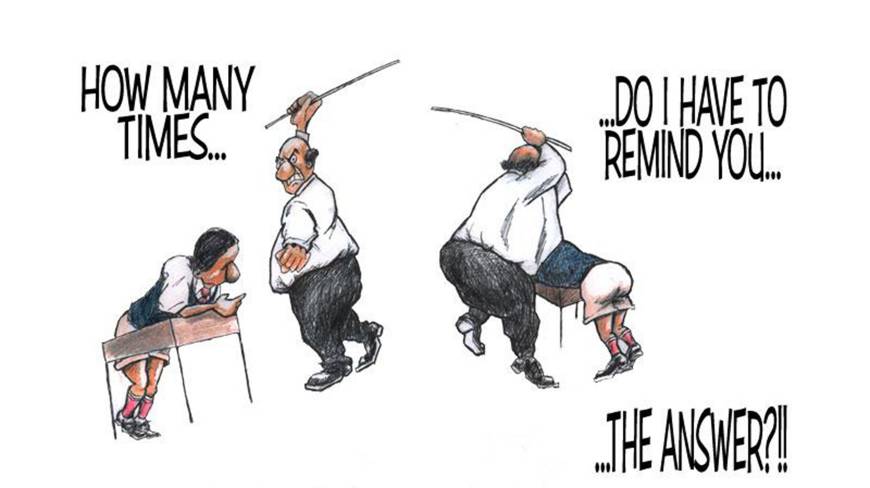Editorial Comment: Let’s use the cane with restraint

A judgment by High Court judge, Justice Esther Muremba in January declaring corporal punishment on juvenile offenders unconstitutional triggered intense debate among parents, teachers and within the judiciary.
Ruling in an appeal by a 15-year-old boy who had been sentenced to receive three strokes with a rattan cane by a magistrate for raping a 14-year-old neighbour, Justice Muremba said canning was degrading and inhuman thus contravenes sections 53 and 86 of the constitution.
“In the new constitution,” she ruled, “the right to freedom from torture or cruel, inhuman or degrading treatment or punishment is under section 53 which reads, ‘no person may be subjected to physical or psychological torture or to cruel, inhuman or degrading treatment or punishment’.
“Section 86 thereof deals with limitation of rights and fundamental human freedoms. Section 86 (3)(c) reads that no law may limit the following rights enshrined in this chapter and no person may violate them, the right not to be tortured or subjected to cruel inhuman or degrading treatment punishment. My interpretation of sections 53 and 86 of the new constitution brings me to the conclusion that corporal punishment is now unconstitutional.”
Her judgment was interpreted in some circles to mean that parents and teachers were thenceforth also not allowed to spank their children or wards as a way to discipline them.
The misinterpretation forced the Constitutional Court in June to declare that parents and teachers could still cane their children and not commit a crime. On Wednesday, the Constitutional Court reiterated that position saying while a decision on whether judicial canning was constitutional or not was still to be made, parents and teachers can continue giving that punishment as a disciplinary measure.
Deputy Chief Justice Luke Malaba said the High Court in January was determining the constitutionality of corporal punishment on convicts not whether or not it was legal for parents and teachers to cane their children.
It is good that the highest court in the land has pronounced itself on this very important matter. It was going to be difficult for parents and teachers to raise their children or teach them adequately in a situation where corporal punishment was unconstitutional. There were going to be many short and long term social implications to the Zimbabwean society if the rod was outlawed.
We must emphasise, however, that we are not advocating administration of corporal punishment as the sole and most effective way to discipline children. We also have to stress that we are not lobbying for indiscriminate use of the cane.
Experience has taught us that children who are frequently canned by their parents or teachers not only lose the sense of pain at some stage in their lives but also will not do the correct thing unless they are canned. Therefore, even if the Constitutional Court has cleared the way for children to be disciplined this way, there is a suitable degree and frequency to which the rod can be used optimally in correcting children.
There indeed are many alternatives that can work similarly well. For example, many children feel a deep sense of punishment and public humiliation almost equal to that caused by spanking if their teacher sends them to the “silent corner,” or are simply threatened with the cane, even if the teacher knows he does not want to use it on the child. Other forms of punishing children may include the teacher making the naughty ones sweep the classroom as their classmates watch or play. In settings where the cane is not used willy nilly, these “softer” forms of punishment can be exceedingly “hard” and effective, obviating the need for corporal punishment.
It is estimated that at least 70 percent of Zimbabweans are Christians. Many of them follow the biblical doctrine on disciplining their children through the cane. For those who follow African tradition they, too, accept the use of the rod in disciplining their children or wards. Therefore, we can safely say a majority of Zimbabwean adults, parents and teachers are pleased with the Constitutional Court position.
Christians cite many sections of the Bible that support spanking. The book of Proverbs has probably the highest number of verses that approve it.
Proverbs 22 verse 15 says, “Folly is bound up in the heart of a child, but the rod of discipline drives it far from him.” Proverbs 23 verses 13-14 says:
“Do not withhold discipline from a child; if you strike him with a rod, he will not die. If you strike him with the rod, you will save his soul from Sheol.” Sheol generally refers to the “grave” or “destruction.”
Proverbs 29 verse 15 says “The rod and reproof give wisdom, but a child left to himself brings shame to his mother.” However, disciplining a child is different from abusing a child. A parent who smacks his child with an electric cable, a hoe handle or bashes him on the floor or wall commits a crime. This is clearly physical violence by a parent on his or her child. It is abuse that must be punished.
But one who uses a moderate switch from a guava tree doesn’t. He inflicts some physical pain on the child, yes, but he does not injure the child. The child will certainly not feel abused, but lovingly corrected. They accept blame for their wrongdoing which is critical in setting a child or anyone for that matter on the right path.












Comments